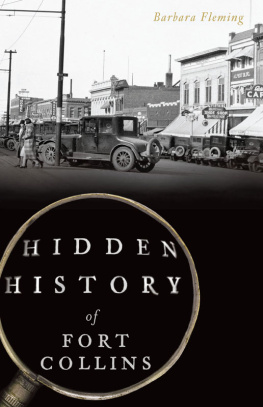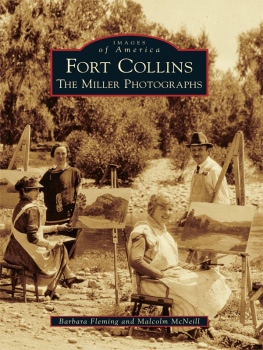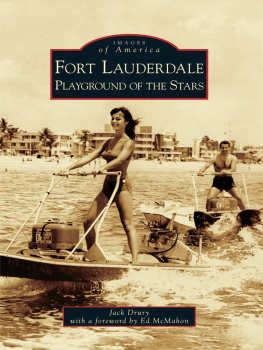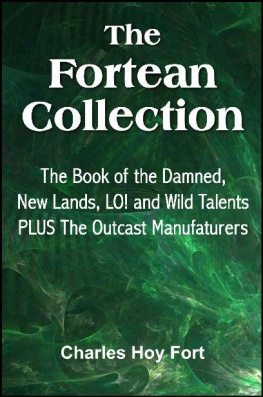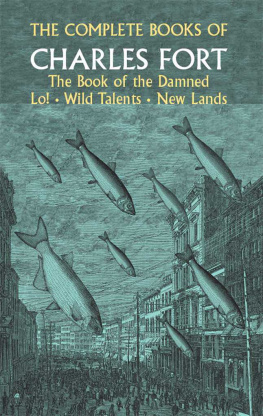Fort - Wild Talents
Here you can read online Fort - Wild Talents full text of the book (entire story) in english for free. Download pdf and epub, get meaning, cover and reviews about this ebook. City: New York, year: 2012;2014, publisher: Start Publishing LLC, genre: Detective and thriller. Description of the work, (preface) as well as reviews are available. Best literature library LitArk.com created for fans of good reading and offers a wide selection of genres:
Romance novel
Science fiction
Adventure
Detective
Science
History
Home and family
Prose
Art
Politics
Computer
Non-fiction
Religion
Business
Children
Humor
Choose a favorite category and find really read worthwhile books. Enjoy immersion in the world of imagination, feel the emotions of the characters or learn something new for yourself, make an fascinating discovery.
- Book:Wild Talents
- Author:
- Publisher:Start Publishing LLC
- Genre:
- Year:2012;2014
- City:New York
- Rating:5 / 5
- Favourites:Add to favourites
- Your mark:
- 100
- 1
- 2
- 3
- 4
- 5
Wild Talents: summary, description and annotation
We offer to read an annotation, description, summary or preface (depends on what the author of the book "Wild Talents" wrote himself). If you haven't found the necessary information about the book — write in the comments, we will try to find it.
Fort: author's other books
Who wrote Wild Talents? Find out the surname, the name of the author of the book and a list of all author's works by series.
Wild Talents — read online for free the complete book (whole text) full work
Below is the text of the book, divided by pages. System saving the place of the last page read, allows you to conveniently read the book "Wild Talents" online for free, without having to search again every time where you left off. Put a bookmark, and you can go to the page where you finished reading at any time.
Font size:
Interval:
Bookmark:

By Charles Fort
Start Publishing LLC
Copyright 2012 by Start Publishing LLC
All rights reserved, including the right to reproduce this book or portions thereof in any form whatsoever.
First Start Publishing eBook edition October 2012
Start Publishing is a registered trademark of Start Publishing LLC
Manufactured in the United States of America
10 9 8 7 6 5 4 3 2 1
ISBN 978-1-62558-106-8
You know, I can only surmise about thisbut John Henry Sanders, of 75 Colville Street, Derby, England, was the proprietor of a fish store, and I think that it was a small business. His wife helped. When I read of helpful wives, I take it that that means that husbands havent large businesses. If Mrs. Sanders went about, shedding scales in her intercourses, I deduce that theirs wasnt much of a fish business.
Upon the evening of March 4, 1905, in the Sanders home, in the bedroom of their housemaid, there was a fire. Nobody was at home, and the firemen had to break in. There was no fireplace in the bedroom. Not a trace of anything by which to explain was found, and the firemen reported: Origin unknown. They returned to their station, and were immediately called back to this house. There was another fire. It was in another bedroom. AgainOrigin unknown.
The Sanders, in their fish store, were notified, and they hastened home. Money was missed. Many things were missed. The housemaid, Emma Piggott, was suspected. In her parents home was found a box, from which the Sanders took, and identified as theirs, 5, and a loot of such things as a carving set, sugar tongs, tablecloths, several dozen handkerchiefs, salt spoons, bottles of scent, curtain hooks, a hair brush, Turkish towels, gloves, a sponge, two watches, a puff box.
The girl was arrested, and in the Derby Borough Police Court, she was charged with arson and larceny. She admitted the thefts, but asserted her innocence of the fires. There was clearly such an appearance of relation between the thefts and the fires, which, if they had burned down the house, would have covered the thefts, that both charges were pressed.
It is not only that there had been thefts, and then fires: so many things had been stolen thatunless the home of the Sanders was a large householdsome of these things would have been missedunless all had been stolen at once. I have no datum for thinking that the Sanders lived upon any such scale as one in which valuables could have been stolen, from time to time, unknown to them. The indications were of one wide grab, and the girls intention to set the house afire, to cover it.
Emma Piggotts lawyer showed that she had been nowhere near the house, at the time of the first fire; and that, when the second fire broke out, she, in the street, this off-evening of hers, returning, had called the attention of neighbors to smoke coming from a window. The case was too complicated for a police court, and was put off for the summer assizes.
Derby Mercury, July 19trial of the girl resumed. The prosecution maintained that the fires could be explained only as of incendiary origin, and that the girls motive for setting the house afire was plain, and that she had plundered so recklessly, because she had planned a general destruction, by which anything missing would be accounted for.
Again counsel for the defense showed that the girl could not have started the fires. The charge of arson was dropped. Emma Piggott was sentenced to six months hard labor, for the thefts.
Upon Dec. 2, 1919, Ambrose Small, of Toronto, Canada, disappeared. He was known to have been in his office, in the Toronto Grand Opera House, of which he was the owner, between five and six oclock, the evening of December 2nd. Nobody saw him leave his office. Nobodyat least nobody whose testimony can be acceptedsaw him, this evening, outside the building. There were stories of a woman in the case. But Ambrose Small disappeared, and left more than a million dollars behind.
Then John Doughty, Smalls secretary, vanished.
Smalls safe deposit boxes were opened by Mrs. Small and other trustees of the estate. In the boxes were securities, valued at $1,125,000. An inventory was found. According to it, the sum of $105,000 was missing. There was an investigation, and bonds of the value of $105,000 were found, hidden in the home of Doughtys sister.
All over the world, the disappearance of Ambrose Small was advertised, with offers of reward, in acres of newspaper space. He was in his office. He vanished.
Doughty, too, was sought. He had not only vanished: he had done all that he could to be unfindable. But he was traced to a town in Oregon, where he was living under the name of Cooper. He was taken back to Toronto, where he was indicted, charged with having stolen the bonds, and with having abducted Small, to cover the thefts.
It was the contention of the prosecution that Ambrose Small, wealthy, in good health, and with no known troubles of any importance, had no motive to vanish, and to leave $1,125,000 behind: but that his secretary, the embezzler, did have a motive for abducting him. The prosecution did not charge that Small had been soundlessly and invisibly picked out of his office, where he was surrounded by assistants. The attempt was to show that he had left his office, even though nobody had seen him go: thinkably he could have been abducted, unwitnessed, in a street. A newsboy testified that he had seen Small, in a nearby street, between 5 and 6 oclock, evening of December 2nd, but the boys father contradicted this story. Another newsboy told that, upon this evening, after 6 oclock, Small had bought a newspaper from him: but, under examination, this boy admitted he was not sure of the date.
It seemed clear that there was relation between the embezzlement and the disappearance, which, were it not for the inventory, would have covered the thefts: but the accusation of abduction failed. Doughty was found guilty of embezzlement, and was sentenced to six years imprisonment in the Kingston Penitentiary.
In the News of the World (London) June 6, 1926, there is an account of strangely intertwined circumstances. In a public place, in the daytime, a man had died. On the footway, outside the Gaiety Theatre, London, Henry Arthur Chappell, the manager of the refreshment department of the Theatre, had been found dead. There was a post-mortem examination by a well-known pathologist, Prof. Piney. The mans skull was fractured. Prof. Piney gave his opinion that, if, because of heart failure, Chappell had fallen backward, the fractured skull might be accounted for: but he added that, though he had found indications of a slight affection of the heart, it was not such as would be likely to cause fainting.
The indications were that a murder had been committed. The police inquired into the matter, and learned that not long before there had been trouble. A girl, Rose Smith, employed at one of the refreshment counters, had been discharged by Chappell. One night she had placed on his doorstep a note telling that she intended to kill herself. Several nights later, she was arrested in Chappells back garden. She was dressed in a mans clothes, and had a knife. Also she carried matches and a bottle of paraffin. Presumably she was bent upon murder and arson, but she was charged with trespassing, and was sentenced to two months hard labor. It was learned that Chappell had died upon the day of this girls release from prison.
Rose Smith was arrested. Chappell had no other known enemy. Upon the day of this girls release, he had died.
But the accusation failed. A police inspector testified that, at the time of Chappells death, Rose Smith had been in the Prisoners Aid Home.
Font size:
Interval:
Bookmark:
Similar books «Wild Talents»
Look at similar books to Wild Talents. We have selected literature similar in name and meaning in the hope of providing readers with more options to find new, interesting, not yet read works.
Discussion, reviews of the book Wild Talents and just readers' own opinions. Leave your comments, write what you think about the work, its meaning or the main characters. Specify what exactly you liked and what you didn't like, and why you think so.







